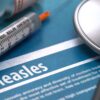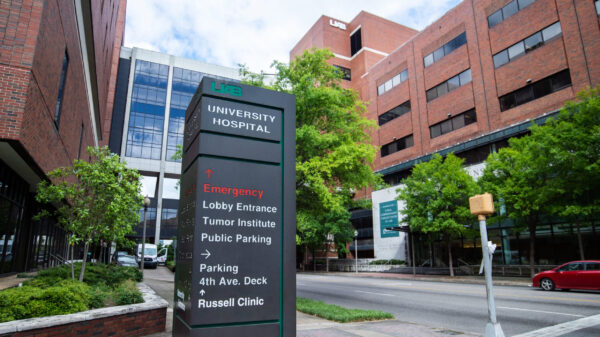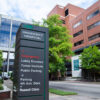The number of people hospitalized with COVID-19 in Alabama hit record highs Sunday and Monday, jumping over 900 on Sunday for the first time since the pandemic began, and then surging past 1,000 for the first time on Monday.[mfn referencenumber=*]This story has been updated throughout at 6:30 p.m. on Monday, July 6 to include the latest figures.[/mfn]
The new highs of 919 patients in hospitals being treated for COVID-19 on Sunday and of 1,016 on Monday were 40 percent higher than the number of patients a week ago on June 28 and more than 50 percent higher than two weeks ago. The seven-day average of that number was also at a new record high Monday.
{{CODE1}}
Dr. Don Williamson, president of the Alabama Hospital Association and a former state health officer, told APR on Monday that 893, or 57 percent of the state’s supply of ventilators, were available Monday morning, while 309 of 1,669 ICU beds, or 18.5 percent, were available.
Williamson said while those two indicators are encouraging, it may take several weeks to learn whether many of those hospitalized will worsen and require ICUs and ventilators, and possibly lead to a rise in deaths. He said another possibility is that younger people are being admitted for COVID-19 but may not become sick enough to require more of the hospitals’ resources, and doctors are getting better at caring for coronavirus patients.
“We just don’t know yet. We don’t know which way we’re going to go,” Williamson said. “We just know we got a whole lot more cases than we had a month ago, and we’ve got a lot more hospitalizations than we had a month ago.”
Williamson said that from the week beginning June 29 to the week starting July 5, the average number of daily COVID-19 hospitalizations increased by 140, rising from 658 hospitalizations to 798 hospitalizations on average during that time. He believes the number of confirmed cases will continue to spike after Fourth of July celebrations.
For six straight days, Alabama has added more than 900 new COVID-19 cases daily, and on Monday the state recorded 925 new cases, and the 14-day average of new cases was also higher than it’s been since the pandemic began, at 1,025.
{{CODE2}}
While testing has increased in Alabama, so too has the percent of tests that are positive, a marker public health experts say shows that there still isn’t enough testing and many cases are going undetected.
{{CODE5}}
The 14-day average of percent positivity was 13.5 percent on Monday, and taking into account incomplete data on negative tests in April, which inflated the positivity percentage, the data Monday was at a record high. Public health experts say the number should be at or below five percent.
{{CODE3}}
The seven-day and 14-day average of daily COVID-19 deaths both were at 11 on Monday, and the numbers have remained largely steady for most of May, June and July.
{{CODE4}}
In the last week, there have been 79 COVID-19 deaths in the state. Since the pandemic began, there have been 984 deaths in Alabama attributed to the virus, and the Alabama Department of Public Health estimates that 23 more deaths are likely due to COVID-19.























































